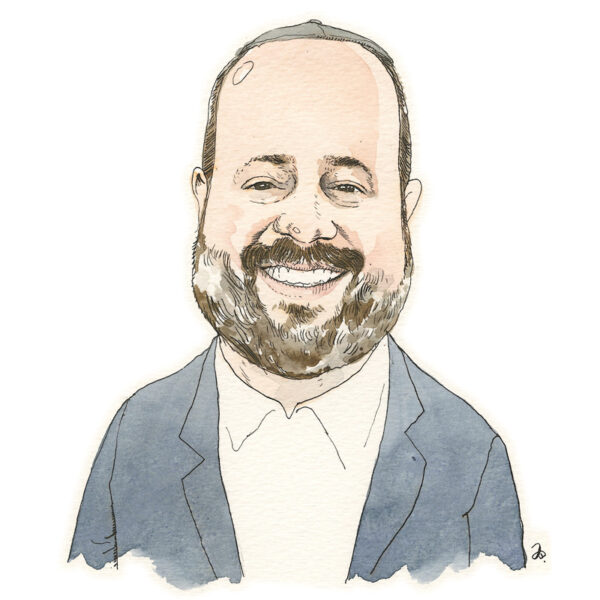ETERNAL HOPE
By Bill McLean
ILLUSTRATION BY BARRY BLITT
Rabbi Jacob Rosenberg
By Bill McLean
ILLUSTRATION BY BARRY BLITT
Rabbi Jacob Rosenberg

Rabbi Jacob Rosenberg’s spleen had to be removed five years go. A cyst inside it was threatening to outgrow the fist-sized organ.
Blessedly, something else, something soothing, expanded at the same time—the rabbi’s perspective.
“All of sudden, day-to-day problems and anxieties, little things, were nothing compared to what was truly important in my life, like faith and family and friends,” recalls Rosenberg, the rabbi at Adat Hatikvah Messianic Synagogue in Deerfield. “You look at things differently, look more big-picture. You embrace all that’s good in life. When I thought I was at a point where death was a possibility, I was OK with it because death is not an end.
“I’m on the board of a wonderful organization called Phil’s Friends. It provides support and care packages and weekly cards for those affected by cancer. I love its mission and its tagline in particular: ‘Cancer is strong. Hope is stronger.’ Hope can be powerful.”
Hope’s capable of moving mountains to other continents and lifting spirits from sea level to the stratosphere. The Easter message is one of new life and hope. Among the themes of Passover’s traditional rites of celebration are hope, freedom, and new beginnings.
Messianic Jews believe God the Son became flesh in the person of Yeshua (Hebrew for “Jesus”), who was and is the promised Messiah.
“He is both fully God and fully man, forever,” notes Adat Hatikvah’s Statement of Faith at adathatikvah.org. “Messiah Yeshua died as the substitutionary atoning sacrifice for mankind’s sin. Yeshua’s death purchased our redemption from the judgment and condemnation of sin.”
Rosenberg, 47, hears it all the time: “Messianic Judaism is trying to combine Judaism and Christianity.”
Not so.
“We’re a reformation movement, believing in restoring the full story from the Bible, the story of Passover and firstfruits,” says Rosenberg, better known as Rabbi Jake to his congregants. “Jesus was the first-fruits of the Resurrection. Both the Old and New testaments expect that one day all the nations will come to believe in the fulfillment of God’s plan.”
Adat Hatikvah—Rosenberg started as a teacher and guest preacher there, in 2013, before becoming the synagogue’s rabbi—will hold a Resurrection Celebration service on April 27, about a month after Easter and five days after the start of Passover.
“You can’t understand Easter without understanding Passover, and you can’t understand Passover without understanding the resurrection of Jesus,” says Rosenberg, who received his Rabbinic ordination from the International Alliance of Messianic Congregations and Synagogues. “Passover is referred to most often in the Bible and takes up the most space.
“When you trust in Jesus,” he adds, “death passes you over.”
Rosenberg’s parents, David and Helene, started a Messianic Jewish synagogue in New York. Jacob entertained thoughts of becoming a comic book artist before figuring a post as a computer technologist in Manhattan would out-steady the income of an artist’s wobbly wage.
He eventually returned to school, earning a bachelor’s degree in religion at Nyack College in New York, a Master of Divinity at Alliance Theological Seminary, and a Doctorate of Philosophy in theological studies at Trinity Evangelical Divinity School in Deerfield.
“I fell in love with teaching at Nyack and came to Trinity to continue teaching at the collegiate level,” says Rosenberg, who lives in Lake County with his wife, California native Heather, and their two children.
Their home houses a restored F-14 Tomcat pinball machine from the 1980s.
The man who refurbished it is the man you’re reading about now.
Among the many mentors on Rosenberg’s path to Adat Hatikvah Messianic Synagogue was the late Jhan Moskowitz, one of the founders of Jews for Jesus and the director of that international missionary organization’s Chicago branch for 25 years.
Moskowitz died in New York City in 2012 at age 64.
Adat Hatikvah is one of the most diverse synagogues in Lake County, with 30 countries represented among its congregants, Rosenberg informs. The synagogue’s values begin with “Love God,” followed by “Love people, pursue excellence, and be eager to grow.” Its teaching distinctions: “To Jewish people first and also the Nations.” Adat Hatikvah teaches the Bible as “One-Story” and centers on the Biblical Calendar.
“People have asked me, ‘Do you celebrate Easter?’” Rosenberg says. “I usually respond, ‘What do you mean by Easter? Bunnies and Peeps?’
“We celebrate the resurrection. It’s a day we look back at what He did. It’s also a day to look forward to what He’ll do. It’s a day to remember we have hope beyond the grave.”
After Yeshua’s death, Adat Hatikvah’s Statement of Faith continues, “He rose from the dead bodily and ascended into the heavens. He is seated at the right hand of the Father. The universal Body of Messiah is made up of all people, both Jews and Gentiles, who have been saved through faith in Yeshua and who have been regenerated by the Spirit of God.”
There appears to be more acrimony and unrest than peace and love in the world today. Pinball fixer-upper Rosenberg is well aware of such a tilt. But he’s also heavy-laden—with optimism.
“As the world seems to get more chaotic, God has plans to give us hope and a future,” Rosenberg says. “Even though it’s dark now, problems will get solved. Jesus is the light of the world. His light is what brings each of us out of darkness, and gives hope to all nations.”
Adat Hatikvah Messianic Synagogue is located at 200 Lake Cook Road in Deerfield. For more information, call 847-843- 1053 or visit adathatikvah.org.
Sign Up for the JWC Media Email